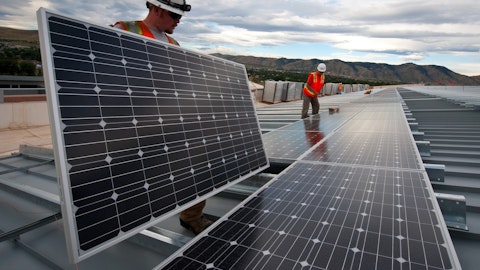Pavel Molchanov: Why are European prices — so there are no tariffs. But of course, that’s always been true. Why do you think European module prices are so cheap right now?
Yumin Liu: I think oversupply has been built up the whole — throughout the whole industry. No matter, it’s modules are battery storage. And the oversupply will continue to be the case in the next, I will say, longer term, not only talking about 12, 18 months, will be longer. That drives the price either at a stabilized low or even go lower. But we feel very comfortable at this time as it is competitively pretty low as we feel comfortable about it.
Pavel Molchanov: Okay. Last question, your IPP revenue of $10 million in the quarter, but you sold some IPP assets. So will that number come down from current levels?
Yumin Liu: Yes and no. The one is that we talk about IPP portfolios. We have US, Europe and China. We sold the China one, okay? The US and literally mostly Europe will continue to be very strong. But China, we sold or will continue selling some Henan and Hebei provinces, the solar farms, the legacy ones is Henan and Hebei province, okay? I believe we talked about the government subsidies in those legacy solar farms. And that is one of the reasons we are considering are we implemented the sales strategy. But at the same time, we are also building new solar projects in China in the focus market, okay? We do see some, I would say, revenue coming down as we sold some in Q2, but the impact to the whole scheme is minimum.
Ke Chen: Yes. Pavel, whole year, the IPP revenue is still about maybe 20% of our total revenue.
Pavel Molchanov: Got it. All right. Thank you very much.
Ke Chen: Thank you, Pavel.
Pavel Molchanov: Thank you
Operator: Thank you. [Operator Instructions] One moment for questions. Our next question comes from Donovan Schafer with Northland Capital Markets. You may proceed.
Donovan Schafer: Hey, guys. Thanks for allowing time for some follow-up questions. I wanted to just a little bit more into the Polish storage market, again, just because I know it seems like it looks like it’s a very big opportunity for you guys. I know you have a legacy kind of relationships and you guys have been in the Polish market for a long time. But I’m curious if you can elaborate on like so to take a counter example. I know Spain, for instance, Spain is kind of notoriously a terrible market for storage because it doesn’t have capacity markets. It doesn’t have markets for things like voltage regulation or other ancillary services. So there’s almost no financial incentive to do storage projects in Spain. So is Poland — in the Polish market, do they have — is it a capacity market?
Do they have these storage projects, someone an asset owner operating a storage project, can they get compensated for all these ancillary services? Or is it — are there more just sort of like direct subsidies or something? Like what’s the economic case for batteries and how that’s structured in the market in Poland?
Yumin Liu: I think the Poland market, we know the demand is there. The utilities with the high demand of the renewable energy and transferring the 80% plus of the coal production to the more renewable energy, they absolutely in big demand of the storage. So that is the given. The second is we do know people are active purchasing or giving pretty good values of the storage projects, including we are even in the process of setting our first storage deal in Poland, okay? Going into the details of the what you just discussed, the revenue streams, I think the utilities and the government, they are developing the scheme as of now. And I think we expect that will be coming. Just simple as I mentioned, Italy, UK as a friend, but Italy will start immediately starting as early as next quarter.




